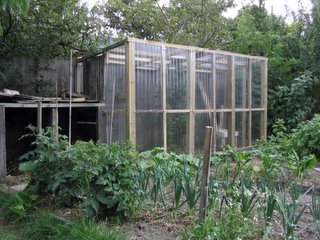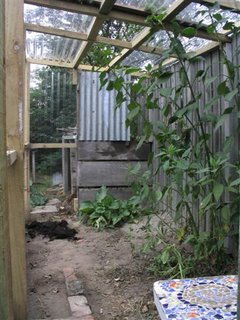'I can grow food with my own hands'. Sustainable Maori horticulture at the microscale...
Monday, October 24, 2011
Sunday, March 20, 2011
Planting it out, in Leeston

Kia ora mai!
Well after a hiatus of many months, in part through the trauma of leaving my old vege garden in Washbournes Rd., Sockburn, we are now ensconced in Leeston, a small country town 25 minutes south of the broken city of Christchurch. I won't dwell on that, other than to say it is a game-changer.
Back to veges...
Our new whare had a big sandpit which i filled with four cubic metres of mushroom/soil mix (the soil out here is very clayey) and planted out with perpetual spinach, broccoli, leeks, spring onions and lettuces. A friend gifted a tomato plant but it's struggled. The section already has a lemon tree, two plum trees, and purple grapes clambering over from the neighbours.

I'm now in the process of extending the vegetable garden, using bricks from our old chimney (chimney's are fingered as death and insurance traps in this country now!). This will give us about 32 square metres in total, a goodly amount.

Sunday, October 03, 2010
Spring 2010
Seems another early spring here in Otautahi. I've found a source of cheap horse manure compostm- well rotted and only $2 a bag off Shands Rd (on the way to Lincoln university from Hornby town).


The boys helped me dig it in, under the careful scrutiny of Willa.

First plants this season are some lettuces from my father-in-law Des. Might put some tomatoes in this week.


The boys helped me dig it in, under the careful scrutiny of Willa.

First plants this season are some lettuces from my father-in-law Des. Might put some tomatoes in this week.
Thursday, January 22, 2009
Bibliography: Maori Sustainable Development, Horticulture and Cultural Resilience
Adger, W. N. (2000). Sociological and ecological resilience: Are they related? Progress in Human Geography, 24: 347-364.
Amin, A., Cameron, A. and Hudson R. (2002). Placing the Social Economy. London and New York: Routledge.
Amin, A. and Thrift, N. (Eds.). (2004). The Blackwell Cultural Economy Reader. Malden, Oxford and Carlton: Blackwell.
Anderson, A. (2002). A Fragile Plenty: Pre-European Māori and the New Zealand Environment. In E. Pawson and T. Brooking (Eds.), Environmental Histories of New Zealand (pp. 19-34). Auckland: Oxford University Press.
Amin, A., Cameron, A. and Hudson R. (2002). Placing the Social Economy. London and New York: Routledge.
Amin, A. and Thrift, N. (Eds.). (2004). The Blackwell Cultural Economy Reader. Malden, Oxford and Carlton: Blackwell.
Anderson, A. (2002). A Fragile Plenty: Pre-European Māori and the New Zealand Environment. In E. Pawson and T. Brooking (Eds.), Environmental Histories of New Zealand (pp. 19-34). Auckland: Oxford University Press.
Tuesday, December 19, 2006
Hue (Gourd) underway...

I've planted several hue plants, the scrambling Lagenaria siceraria, having last grown them three seasons ago. This plant seems to be another South American import.
Sunday, December 10, 2006
The Diffusion of Sustainable Technologies to Maori Land: A Case Study of Participation by Maori in Agri-Food Networks
Abstract: Within innovation diffusion literature, indigenous peoples have historically been described as ‘laggards’: slow to adopt new technologies. While accepted as the originators of (acceptably ‘quaint’) traditions, Maori, like other indigenous peoples, are targeted as passive adopters of new and theoretically beneficial innovations. However within sustainability discourse, indigenous peoples are considered to possess innovations conducive to sustainability. For Maori, this assumption has converged with niche marketing strategies in agri-food networks and Maori initiatives to participate in research programmes. This paper details the diffusion of innovative objects in the form of taewa or ‘Maori potatoes’ within sustainability research programmes. Knowledge sourced from Maori in their role as kai tiaki of taewa have seen attempts by research institutions to accommodate Maori growers within collaborative programmes. However, the intended diffusion of collaborative research with Maori outwards from ‘core’ research institutions is paradoxically reliant on a counter-diffusion of ‘Matauranga Maori’ from Maori growers. This counter-diffusion is subject to validation from Maori collectives: if cooperation is withdrawn by these collectives, progress is not possible. Rather than the non-adoption of sustainable technologies by Maori, such withdrawal is interpreted as non-participation in unsustainable networks.
Keywords: Maori horticulture, agri-food networks, potatoes, innovation diffusion.
Friday, January 20, 2006
the new tunnel house...
After two years in the planning, it was only a 3 day job, like the Resurrection. Have missed out on picking up many of the seedlings I would've like to have planted (do have a Thai Basil that might go on). I'm going to transplant my underperforming Lemon tree inside...quietly cutting the roots through.

The frame was built around two existing plants, a Jerusalem artichoke and a rhubarb. The lemon tree will go where that compost is lying.


The frame was built around two existing plants, a Jerusalem artichoke and a rhubarb. The lemon tree will go where that compost is lying.

Monday, January 09, 2006
Sockburn Summer Garden progress

Feared the worst after hearing of nor-west gusts and hail storms but the garden survived largely intact. In fact the worse problem is some signs of virus on my kamo kamo (possibly picked up from a neighbouring courgette plant).

Here's a picture of a small kamo kamo. Ready for picking and a light boil and served up with taewa ... I have huakaroro this season)(and yes, the afficianado would insist on pata and tote).
Friday, January 14, 2005
Rationality gone mad..."Voltaire's Bastards"
Currently rereading John Ralston Saul "Voltaires Bastards", a book I first read around 5 years ago (then lent to a mate, my tattoist, Martin Saddler, who promptly lost it and all his and partner Vanya Tickles' possessions in a house fire on the Otago Peninsula). Saul hoes into the 'feudal fiefdoms' that I recognise in university research, especially matauranga Maori. We are guarding our little patches (and believe me, they are little) against all-comers, as if we can't believe some fool locked us in the lolly shop. And we parody the Enlightenment call for free and open rational debate, all the time holding to a self-agrandising display: colonial mutton dressed up as cultural lamb.
Had a classic display of this in my project where, for purposes of statistical analyses I was told (by a senior Maori scientist recently bestowed with a Queens honour, for what it's worth...) that the most important thing was to have a 'Representative Sample Group of Maori Growers', known for the rest of that meeting as the RSMG (gotta have an acronym, right...). Anyway, I always thought that would be a tricky thing to get, given that Statistics NZ has struggled to identfy Maori (as they acknowledge themselves...goddam uncontrolled sex lives that we had in the colony...).
Had a classic display of this in my project where, for purposes of statistical analyses I was told (by a senior Maori scientist recently bestowed with a Queens honour, for what it's worth...) that the most important thing was to have a 'Representative Sample Group of Maori Growers', known for the rest of that meeting as the RSMG (gotta have an acronym, right...). Anyway, I always thought that would be a tricky thing to get, given that Statistics NZ has struggled to identfy Maori (as they acknowledge themselves...goddam uncontrolled sex lives that we had in the colony...).
Subscribe to:
Posts (Atom)

